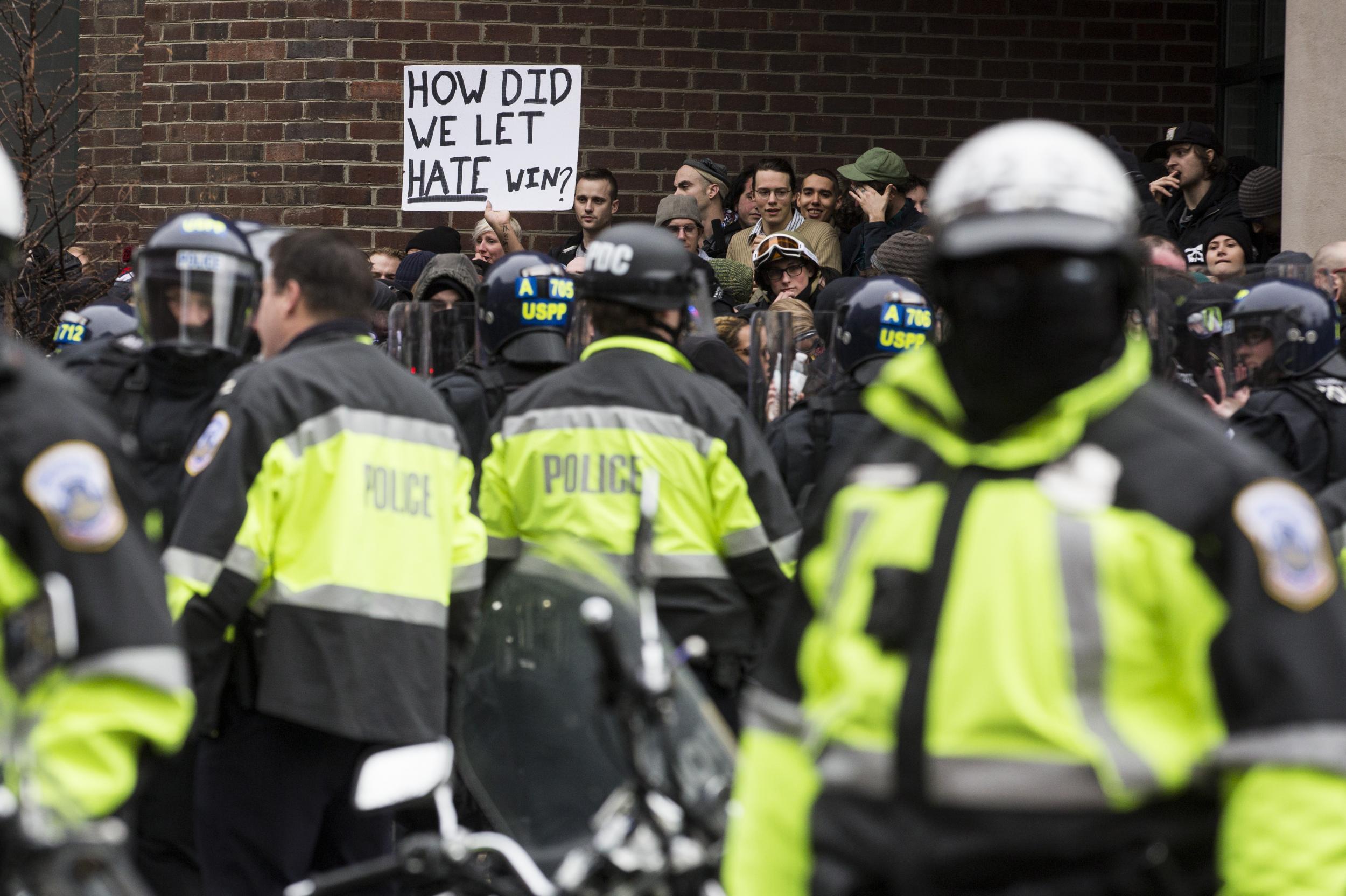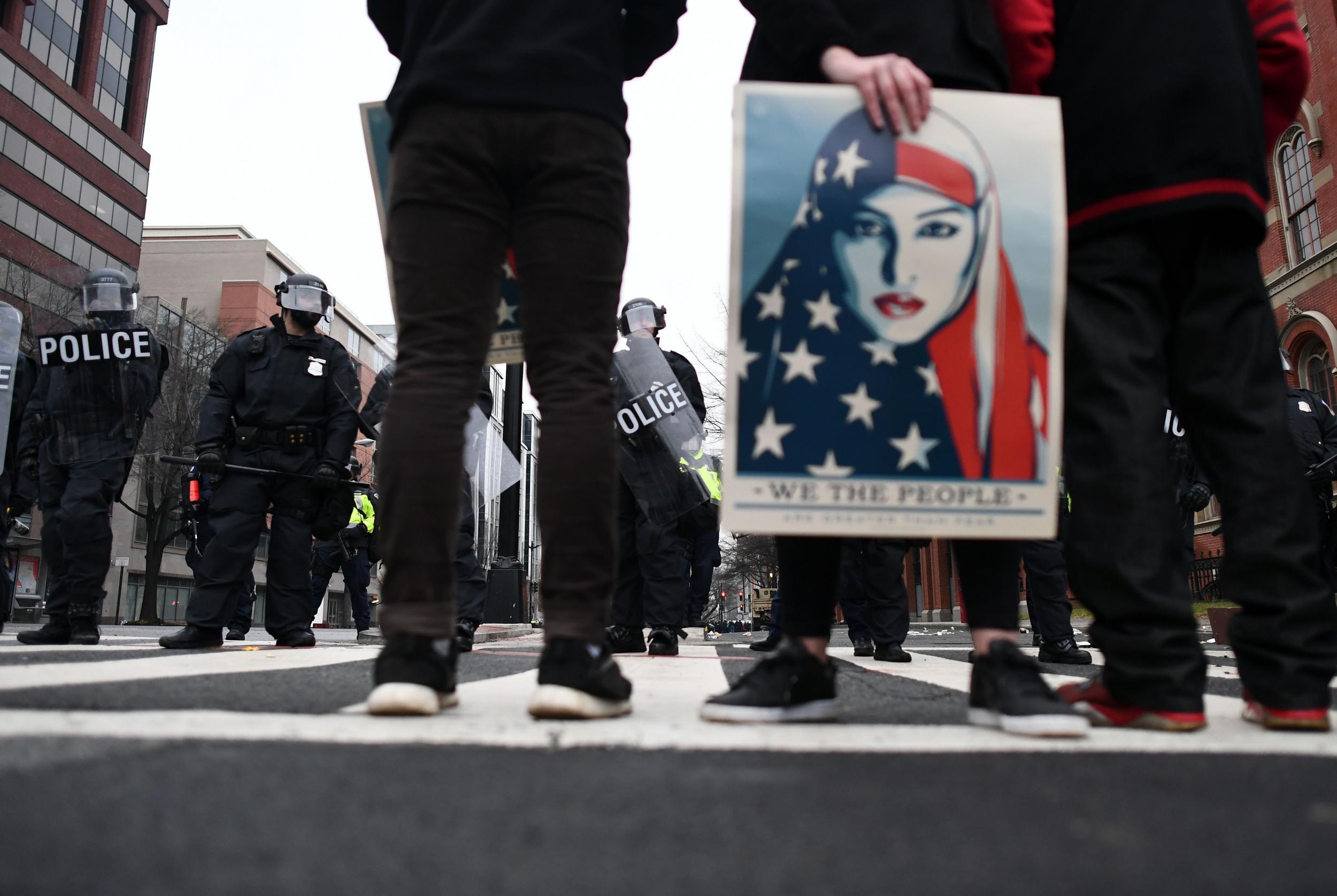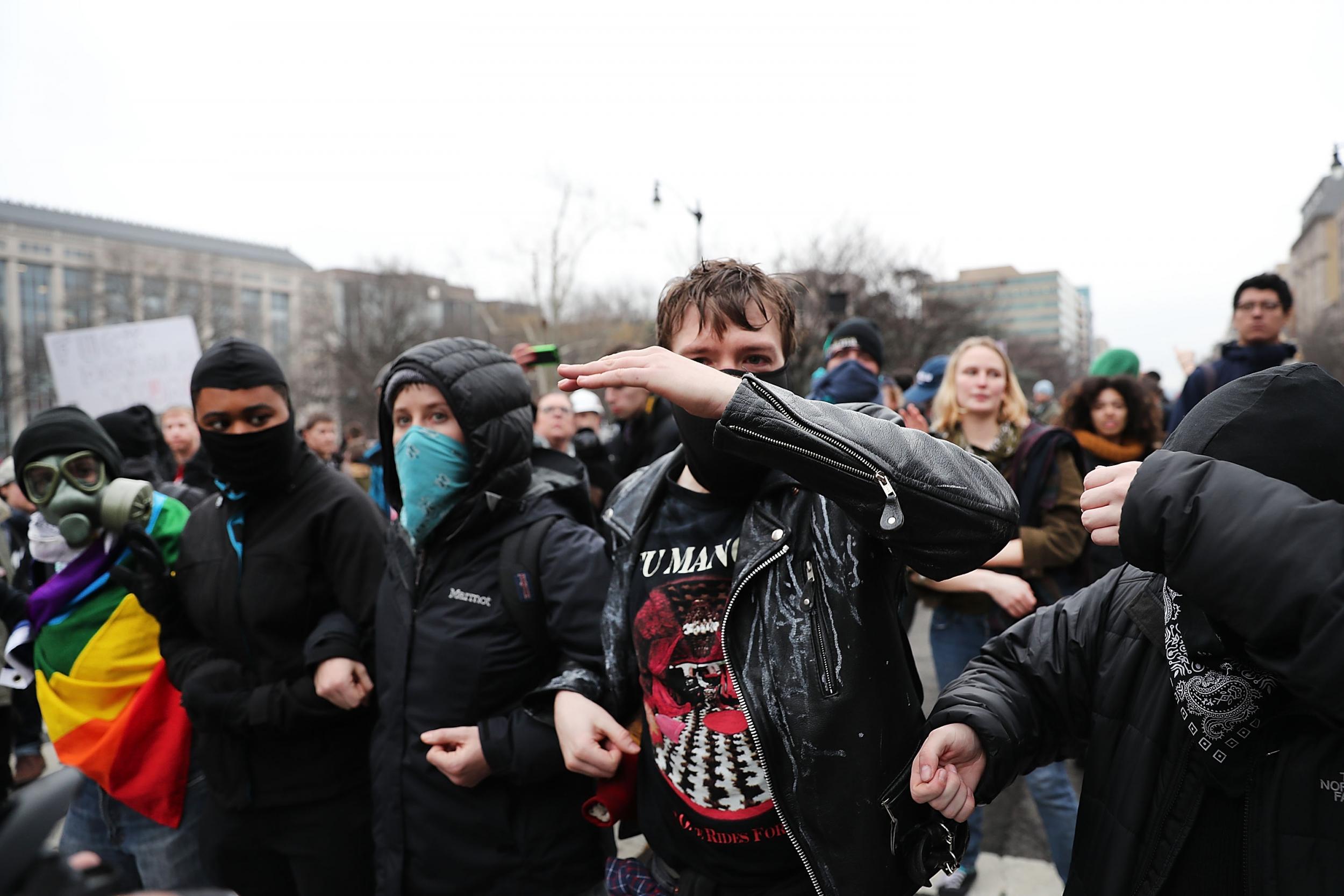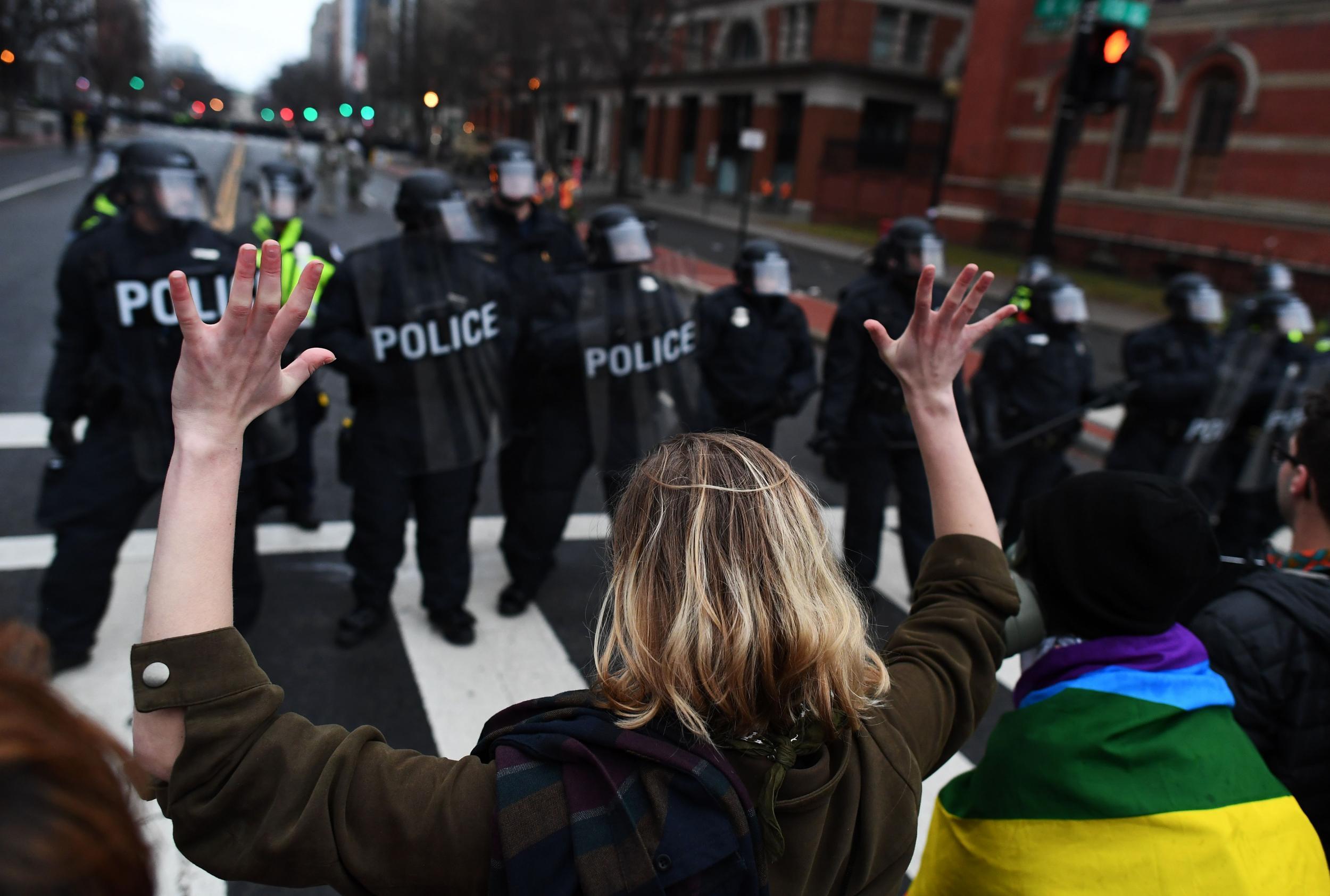J20 protests: What it's like to face 60 years in prison for protesting Trump
Almost 60 people still face decades in prison for marching during Trump's inauguration

Elizabeth Ariadne Lagesse and Michael Webermann had been engaged for all of nine days when they were arrested and charged with six felonies for protesting Donald Trump’s inauguration. Now, instead of planning their wedding, they’re crafting a legal strategy to avoid up to 60 years in prison.
Ms Lagesse, a chemical engineering student, and Mr Webermann, the founder of a non-profit, made their two-year courtship official on 11 January 2017, in the shadow of Mr Trump’s election victory. They exchanged gifts – a ring for Elizabeth, and a pocket watch for Michael – at the cocktail bar where they had their first date. Nine days later, they – like hundreds of thousands of other outraged Americans – headed to Washington DC to protest the inauguration.
“We had the same problems with Trump that everyone else did,” Ms Lagesse said. “His particularly cruel brand of racism, sexism, and hate was just too much.”
Ms Lagesse and Mr Webermann participated in the Disrupt J20 march, an anti-fascist, anti-capitalist protest in the heart of Washington. The protest went smoothly until about 10:30am, when some of the marchers broke off from the group and began breaking windows and throwing rocks. Police later claimed that a small group of protesters had created an estimated $100,000 (£70,600) worth of property damage.
DC Metropolitan Police surrounded more than 200 of the marchers in a formation known as a “kettle”, and held them for hours while they shipped participants to local jails in small batches. The protesters – some of whom were journalists, medics and legal observers – were held overnight. The majority of them would eventually be charged with six felonies, ranging from conspiracy to riot to destruction of property.
In the year following the arrests, the number of people charged dropped dramatically. When the first six defendants stood trial last month, prosecutors admitted they had no evidence these people had actually broken any windows, or thrown any rocks. Instead, they argued the defendants were guilty for participating in a protest in which property was destroyed.
“We don’t believe the evidence is going to show that any of these six individuals personally took that crowbar or that hammer and hit the limo, or personally bashed those windows of that Starbucks in,” Assistant US Attorney Jennifer Kerkhoff told the jury in her opening statement. “You don’t personally have to be the one that breaks the window to be guilty of rioting.”
The jury cleared all six defendants of all charges.
Weeks later, the prosecutor’s office dropped the charges against 129 of the remaining defendants, saying they would refocus their efforts on a core group of protestors they felt were “most responsible for the destruction and violence that took place on Inauguration Day”. The attorney’s office declined to comment further for this article.
Many of the 59 remaining defendants in this “core group” say they had little to nothing to do with the planning of the protest, and nothing at all to do with the property destruction that occurred. Instead, they say, the state is using them as an example of what happens to dissenters.
Even if the state fails to earn a conviction, the defendants argue, they will still have spent more than a year in limbo – waiting to get married, wondering if they will ever attend their children’s graduations – for protesting an American president.

In the year since their arrests, Ms Lagesse and Mr Webermann have dropped their plans to move to California and moved into a small apartment in Washington, in order to be closer to the courthouse. Ms Lagesse – the first person in her family to attend college – has put her dream of working in tech on hold while they await the decision. Michael supports both of them on his non-profit salary so his fiance can focus on fighting the charges.
“It’s been a really frustrating and kind of disempowering and hopeless feeling,” Ms Lagesse said. “I was enjoying the work I was doing; enjoying feeling like I was on a path where I was accomplishing things I cared about... It’s a real mental blow to feel like I’m not getting to use any of the skills I worked so hard to build.”
Another defendant, a university professor in his 30s, has struggled to find a new job – something he has to do every three to four years, because he works on a contingent contract. When he applied for new positions in the past, he said, he received two or three responses for every 10 applications. He has sent out applications to 15 universities in the last five months. None have responded.
While he can’t be sure, the professor – who asked not to be named for fear of further damage to his job prospects – believes the lack of response is due to his felony charges. The universities he applied to were well within his prospects, he said, including one application to the institution where he is currently teaching.
His trial is not scheduled to take place until the end of this year, meaning his job search will have stalled for nearly two years while he awaits an outcome.
“For two years I am accused but not convicted, and for two years I will be treated, at least bureaucratically, like I have been convicted,” he said.

In the meantime, conservative detractors have been trying to alert his employer of the charges against him. The right-wing “trolls” managed to target the wrong university, the professor said, and his current employer is aware of the charges. But the message is still clear: his political opponents are coming after him.
Almost all of the defendants have faced some kind of internet harassment this year, after a right-wing news site published a police document containing their names, dates of birth and addresses. Mr Webermann said his non-profit’s Facebook page has been swamped with comments asking whether its followers know about his felony charges.
Other harassment has been more serious: “So all these people are going to die soon, right?” a right-wing message board commenter recently wrote below a list of the defendants’ names.
Olivia Alsip, a 24-year-old defendant, said she had received similar death threats against both herself and her family.
“I don’t just fear for me but I also fear for the people around me,” she said. “I think it would be easier to deal with if it was a matter of violence against me. That’s still really scary, but it makes me a lot more concerned that people I care about might get hurt because of this – because of me.”

Isaac Dalto, a 27-year-old defendant, knows this feeling well. He was arrested and charged last year alongside his younger sister, who he encouraged to attend the protest. Mr Dalto said he told his friends and sister not to worry about the threat of arrest that day. Now feels he may have mislead them.
“I didn’t know that I was misrepresenting the truth to people,” he said. ”And then we showed up [at the protest] and they treated us more brutally than I’ve ever seen police treat a demonstration anywhere.”
The police department declined to comment.
Adding to Mr Dalto’s unease is the fact that the prosecution has identified him as an organiser of the protest. (He says he was not). Even as he and his sister carpooled to their court dates in Washington, and grew closer than ever before, he worried that her proximity to him would be used against her in court.
Earlier this month, Mr Dalto got an unexpected break: While his charges still stood, his sister was among the 129 defendants whose charges were dropped. Thrilled, he called his sister and told her to sit down – he had some good news.
His sister, he recalled, seemed less excited than he was.
“I kind of think she had survivor’s guilt about it a little bit,” Mr Dalto said. “She was obviously really happy for herself, but I think she was confused and thought it was unfair that me and 58 other people were still in this position.”

Other defendants’ families have been less supportive. Ms Alsip has not spoken to her father – an ardent Trump supporter – since she was charged. She said her father got most of his information about the trial from Fox News, whose reporters described the protesters as “provoking the riot police” and the officers as “fighting to take the street back”.
After seeing the coverage, Ms Alsip said her father “flipped out” and told her to stop associating with the causes she had protested for – not an acceptable option to Ms Alsip, a community organiser by trade.
“I would really love to have a fruitful conversation with him – or anyone else, honestly, who wonders about what we do, and what we care about and what we’re fighting for,” she said. “But I just think most people aren’t open to that unfortunately.”
She added: “It takes two people to have a conversation.”
The university professor, meanwhile, said he is struggling to imagine a life without his own family – especially his three young children. When they start talking about the future – birthdays, graduations, performances – he sometimes has to leave the room to cry.
“I’ve done that a number of times,” he confessed, “because I’ve always lived under the assumption that I’d be there for my kids’ lives.”
This is perhaps one small, silver lining for Ms Lagesse and Mr Webermann: Daunting though it is, they are able to face their uncertain futures together. They have lost friends over the last year – “When you have no money and the main thing going on in your life sucks, slowly the invites really do decline,” Mr Webermann joked – and their families have struggled to grasp the enormity of their charges. But in each other, they have someone who truly understands.
The couple plans on getting married no matter the outcome of their trials. (“It’s not like we could hold our criminal record against each other,” Ms Lagesse pointed out). In fact, they think the whole process has brought them closer together.
“I think we have more pride in each other,” Mr Webermann said of their relationship over the past year. “My awe for Elizabeth has increased dramatically.”
To his fiance, he added: “I think it’s sexy to see you fighting injustice.”
Join our commenting forum
Join thought-provoking conversations, follow other Independent readers and see their replies
Comments
Bookmark popover
Removed from bookmarks